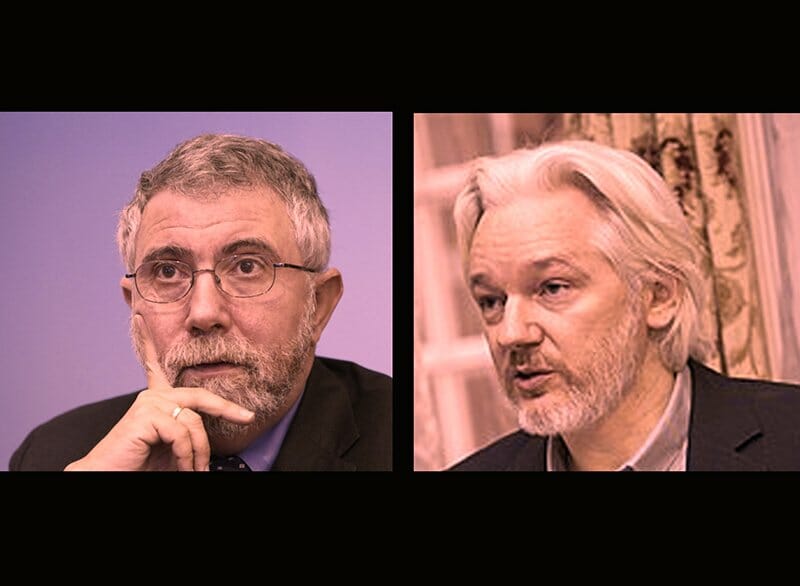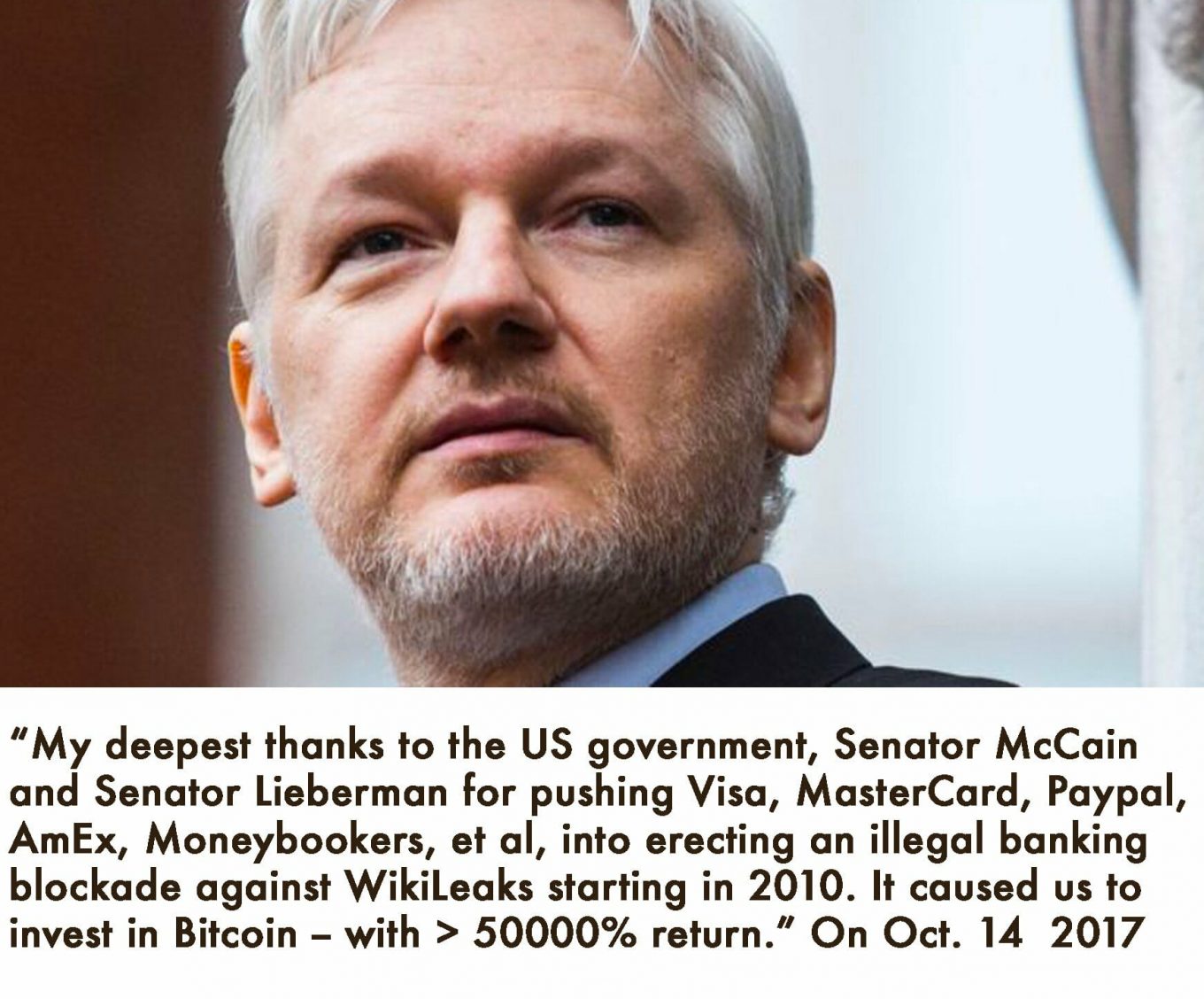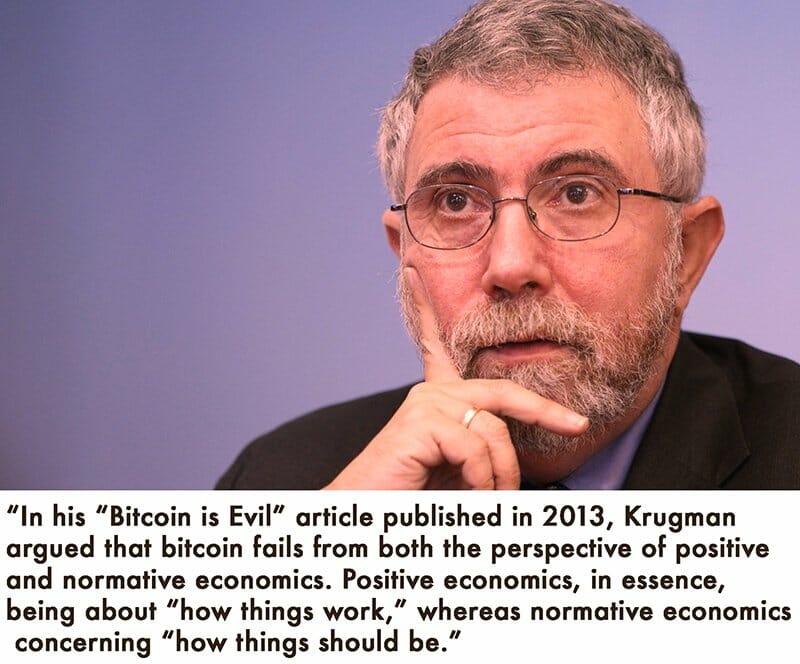
What important people like Julian Assange and Paul Krugman Think About the Future of Blockchain?
By Karolina Makuch
Julian Assange, Wikileaks founder and the famous American economist Paul Krugman, are both interested in Blockchain. However, they find themselves on two separate sides of the debate. What is it that they say:
Julian Assange
Julian Assange is a computer programmer and political activist, best known for founding WikiLeaks, a political non-profit widely recognised for leaking classified information, such as Hillary Clinton’s emails during the 2016 presidential campaign.
Most notably, its leaks have included the Collateral Murder video, which was released in 2010 and depicts a Baghdad airstrike. What sparked controversy was the behaviour of the cabin crew, with one of the soldiers laughing and saying “I hit ’em,” and another responding a little later, “Oh yeah, look at those dead bastards.”
Former US Vice President Joe Biden called Assange a “hi-tech terrorist” and other politicians have compared him to Al-Qaeda and Taliban leaders. If extradited to the US, Assange faces up to 45 years in prison. Despite the joint effort of European countries to capture the Wikileaks founder, Assange was granted asylum at an Ecuadorian embassy in London and has lived there since June 19, 2012.
In 2010, the US government put pressure on companies like financial giant Mastercard to block ongoing payments to Wikileaks. It is not surprising, therefore, that Assange is a big fan of cryptocurrencies, which provide a way around traditional bank payments. Fortunately for Assange, accepting crypto payments for WikiLeaks’ services turned out to be a money-making machine.
On Oct. 14 2017 Assange tweeted: “My deepest thanks to the US government, Senator McCain and Senator Lieberman for pushing Visa, MasterCard, Paypal, AmEx, Moneybookers, et al, into erecting an illegal banking blockade against WikiLeaks starting in 2010. It caused us to invest in Bitcoin — with > 50000% return.”
Since then, Assange has praised bitcoin for its low-cost transactions, transparency and ease of automation. To attract more donors, Wikileaks now accepts bitcoin, litecoin, monero and zcash. That’s not all, either.

Assange’s foundation also sells their own CryptoKitties – a blockchain-based virtual game that lets players buy, breed or sell various types of “cats” — with names such as “NSA Spying Kitty,” “Iraq War Kitty” or “Guantanamo Kitty.” Despite the lighthearted theme of the game, some limited-edition kitties have been sold at a whopping $110,000 USD.
Despite Assange’s high-profile, colourfully vocal support for cryptocurrency, not everyone in crypto is happy about him making strides into the crypto-sphere. On April 23, 2018, digital currency exchange Coinbase suspended Wikileaks’ bitcoin account, claiming the reason for suspension was that the company was “breaking the terms of service.”
Wikileaks has since called for a boycott of Coinbase as it “has become an unreliable and even dangerous service, subject to arbitrary actions as it merged with the US banking sector and started to provide information on its own customers to the US government.”
One Twitter user even satirically suggested that “Coinbase may have merged with [the] Clinton Foundation.”
Nevertheless, Assange remains steadfast in his enthusiasm for crypto and warns: “If you don’t invest in Bitcoin during the current meltdown you will regret it for the rest of your life!”
Paul Krugman
Paul Krugman is a staunch bitcoin critic, a Nobel prize-winning economist and the author of books such as “The Conscience of a Liberal” and “The Return of Depression Economics.” His New York Times articles “Bitcoin Is Evil” and “Bubble, Bubble, Fraud, and Trouble” have gained him notoriety in the cryptocurrency community.

Crypto commentators have not been generous to Krugman’s views, pointing out that his predictions are often inaccurate. In 1998, long before the creation of Bitcoin and the baby boom of altcoins, Krugman wrote that “by 2005, it will become clear that the Internet’s impact on the economy has been no greater than the fax machine.”
In his “Bitcoin is Evil” article published in 2013, Krugman argued that bitcoin fails from both the perspective of positive and normative economics. Positive economics, in essence, being about “how things work,” whereas normative economics concerning “how things should be.”
In regard to the former, Krugman is sceptical as to whether bitcoin can be a stable store of value in any economy. “I have had and am continuing to have a dialogue with smart technologists who are very high on BitCoin,” says Krugman, “but when I try to get them to explain to me why BitCoin is a reliable store of value, they always seem to come back with explanations about how it’s a terrific medium of exchange.”
In terms of normative economics, or how things “should” be, Krugman does not shy away from critique of the very ideology, which he thinks underpins the idea of cryptocurrency – libertarianism. Libertarian agenda is, as another prominent bitcoin critic puts it, “to damage states ability to collect tax and monitor their citizens financial transactions.” Krugman’s belief is that many bitcoin supporters are enthusiastic about the digital currency because “it pushes the same buttons as their gold fetish.”
Krugman’s sceptical stance was met with strong criticism from the crypto community. One Twitter user created a poll, asking: “I spent several weeks working on my 87-page crypto report in July that went out to subscribers. How much time do you think Paul Krugman spent on his hatchet job bitcoin article for the New York Times today? ”The most popular response? “Less than 45 minutes.”
Another user attacked Krugman for saying that crypto does not solve a “clever problem.” They write: “He’s never heard of inflation, bad governing, or the byzantine generals’ problem. So, he’s not consulting with any actual cryptologists or computer scientists. He’s just blabbing.”
Krugman was also accused by Timothy B. Lee, a technology journalist and blockchain enthusiast, of “misleading readers more than informing them.” In his 2013 Washington Post article, Lee wrote that bitcoin mining is actually a part of the bitcoin transactions process, which means that “without it, the Bitcoin network wouldn’t function at all.” According to Lee, Krugman fails to mention this fact in his works and focuses solely on the process by which new bitcoins are created.
In spite of criticism, Krugman remains persistent. In July 2018, he responded to a claim that the Russians funded the election hacking operation by mining bitcoin, tweeting: “and people say bitcoin has yet to find any real-world uses…”
Bio:
Karolina Makuch is a final-year Law student at King’s College London, Head of Journalism at KCL Blockchain, and an aspiring writer. She is interested in Blockchain, Artificial Intelligence, Politics, Philosophy, and Horse Riding, amongst other things.
KCL Blockchain is a student organisation operating out of King’s College London. Our strong team of Blockchain researchers and developers comprises of Technical, Legal and Business oriented individuals.
At KCL Blockchain, our aim is to get people excited about Blockchain technology. In addition to writing about Blockchain, we accomplish this task by organising exciting, engaging, and in-depth events to share with you the latest insights in the world of Blockchain. We are also conducting research in these areas, partnering with companies, and fostering the education of our technical members.
Get in touch with us on Facebook, LinkedIn or Instagram:
https://www.kclblockchain.com/



























